Rallies held nationwide to celebrate 41st anniversary of Islamic Revolution
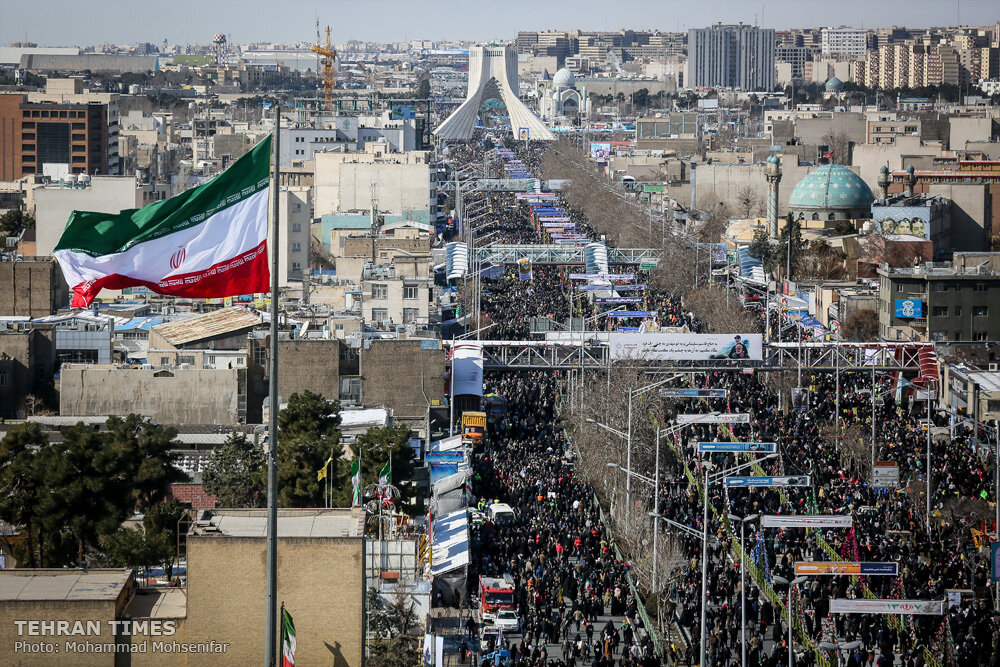
TEHRAN – In a show of national unity, Iranians took to the streets in very large numbers across the country to celebrate the 41st anniversary of the the Islamic Revolution.
This year’s celebrations, known as the Bahman 22nd in the Persian calendar year, fell on Tuesday.
Cold wind snow and rain could not deter people from all walks of the life to participate in the rallies to renew their loyalty to the Islamic Republic system.
The rallies began at 8:30 a.m. local time. National anthems were sung in the streets and helicopters were pouring flowers.
The marchers were waving national flags and the photos of legendary commander General Qassem Soleimani, who was assassinated in a U.S. terror attack in Baghdad on January 3.
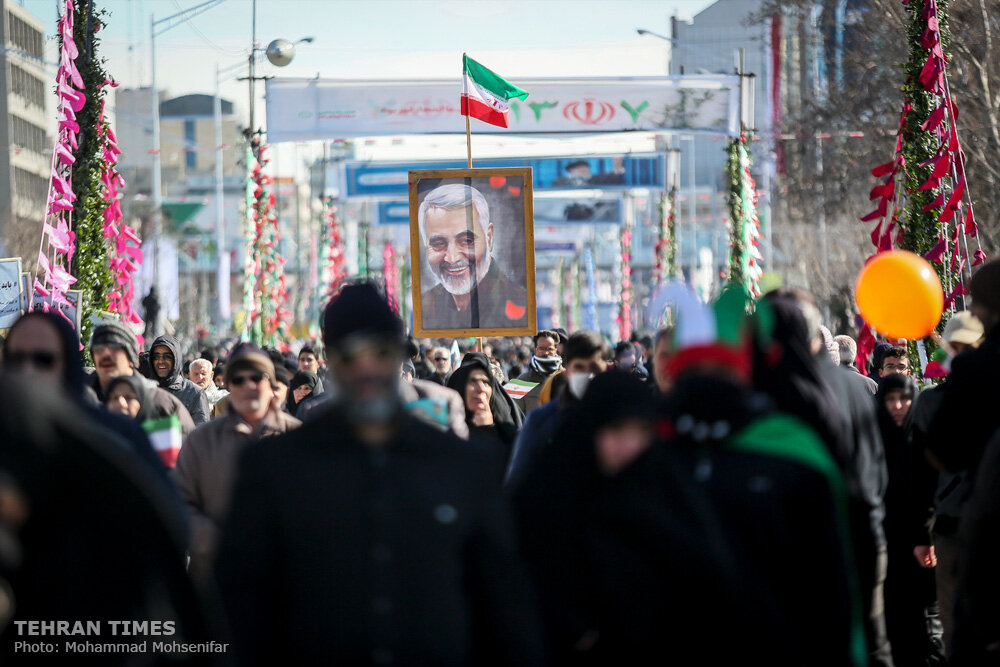
The rallies this year were of significant importance both because of the Soleimani assassination and the tightening of sanctions against Iran in line with Donald Trump’s “maximum pressure” strategy against Iran.
More than 6,000 reporters and photographers including 300 foreigners, were covering the nationwide rallies.
In the capital Tehran, the marchers crossed different routes to reach Azadi Square, where President Hassan Rouhani addressed the participants.
The Iranian nation toppled the despotic regime of Pahlavi, which was fully supported by the United States in the winter of 1979. The struggle against the shah regime reached full fruition on February 11, 1979.
By December 1978, millions of Iranians had taken to the streets in protest against the policies of the shah on a regular basis.
Grand Ayatollah Ruhollah Khomeini returned from exile to Iran on Feb. 1, 1979. He was received by millions of well-wishers after the departure of the shah in mid-January 1979.
The collapse of the shah regime became certain on February 11 when the military renounced its loyalty to the shah and joined the revolutionary forces.
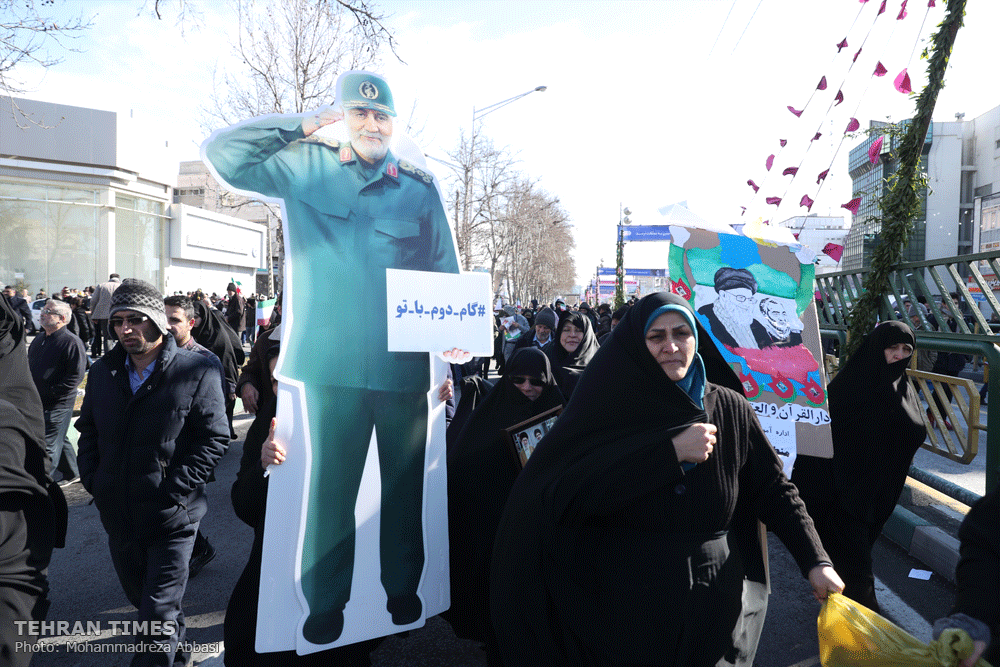
Rouhani: Our revolution was a choice
Addressing the marchers in Tehran, President Rouhani said, “Our revolution was a choice”.
President Rouhani went on to say that if the Pahlavi regime allowed the people to decide about the kind of ruling system that they liked there was no need for the revolution.
‘There was no need for revolution if shah gave people the right to choice’
“If the previous corrupt regime gave the right of the choice to people there was no need for the revolution,” the president remarked.
He said the Pahlavi regime did not allow the people to select their own desired constitution and choose “independence” instead of being dependent on the West.
“If the previous regime had accepted a healthy and free election, the revolution would not have happened,” the president added.
"It is natural that U.S. cannot tolerate the Islamic Revolution because it knows Iran’s great power in the West Asian region," Rouhani remarked.
The U.S. has been dreaming of a return to Iran since 41 years ago, the president added.
Americans had chosen the monarchy for Iran and wanted to preserve it and that is why they are opposing the path the Iranian nation have chosen, Rouhani said.
"The U.S. says that they (Iran) must return to 41 years ago but we say we don’t do so … therefore, we see hostility of the U.S. has emerged during the past 41 years in various forms."
He called on the Iranian nation to boost their unity. “If we are united, the U.S. will be defeated and economic growth will happen.”
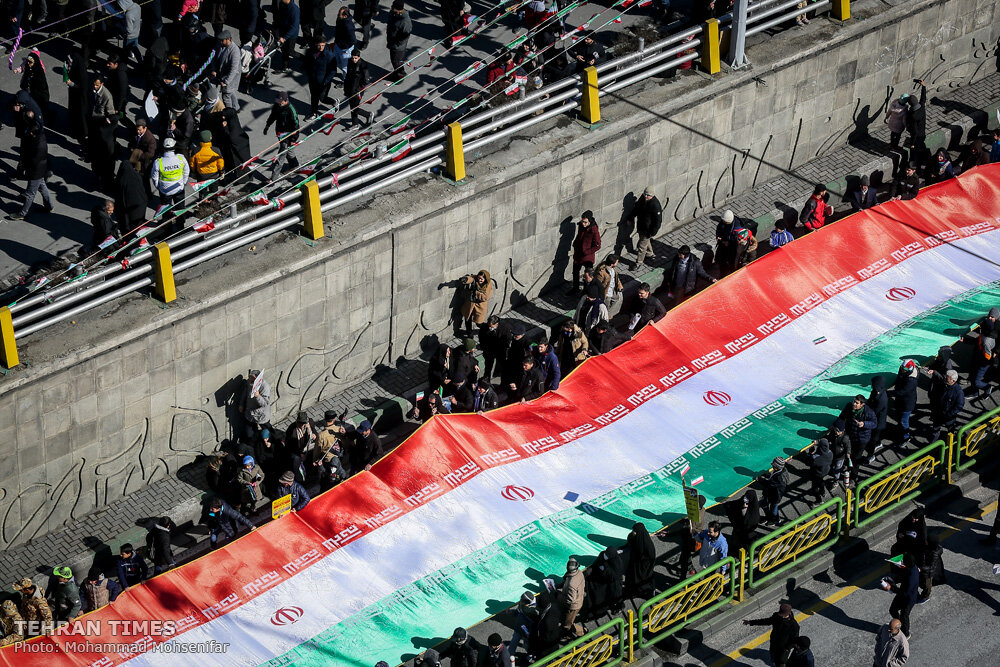
Rouhani said that both diplomacy and resistance are needed to confront enemies.
Elsewhere in his remarks, Rouhani praised the achievements of the country in the defense field over the past years, saying, “Before the Islamic Revolution, 95% of the required arms were imported to the country, while today all of our needs are fulfilled domestically; this means we have scientific capability and military might.”
Vice president: Islamic Revolution not static, but dynamic
First Vice President Es’haq Jahangiri, who had participated in the rallies in Zahedan, the capital of Sistan-Baluchestan province, said the Islamic Revolution is not a historically static event. Rather, he said, a dynamic development and a brand new social movement initiated by the Iranian nation.
Jahangiri said the Islamic Revolution happened not by reliance on any foreign military power but through people's support.
He added that the rallies on the anniversary of the Islamic Revolution sent an important message to the enemies and showed that the people are supporting the Islamic republic system.
Jahangiri went on to say that the Islamic Revolution is opposed to violence and is not reliant on a special group, sect, or social class.
It is a multi-sided revolution and people form its core, he pointed out.
Zarif: Funeral procession for General Soleimani was a referendum
Participating in the rallies in Tehran, Foreign Minister Mohammad Javad Zarif said the huge participation in the funeral procession for General Soleimani was a referendum.
Millions of people took the street in Tehran in Tehran on January 6 to pay their respect to General Soleimani. It was the greatest gathering since the victory of the Islamic Revolution.
“The funeral procession of martyr Soleimani was a public referendum in order to announce to the U.S. that it is the U.S. that is terrorist.”
People also took part massively in the funeral processions in Ahwaz, Mashhad, Qom and Kerman, the birthplace of the general.
Zarif went on to say that regional people hate the U.S. for assassinating General Soleimani.
“Our people and regional people have shown over the past 40 days – since the martyrdom of General Soleimani – that the U.S. is detested for the terror attack,” Zarif remarked.
Zarif had already said the U.S. targeted a commander who had fought ISIS (Daesh), al-Qaeda, al-Nusra and other terrorist groups. The chief diplomat had also said only the U.S. and ISIS cheered Soleimani’s death.
Speaking to reporters on the sidelines of the rallies, Zarif also said the enemies have failed to truly know the people of Iran after 41 years.
"That is why they think that the Iranian people will stop supporting the Islamic Revolution if they keep their pressures."
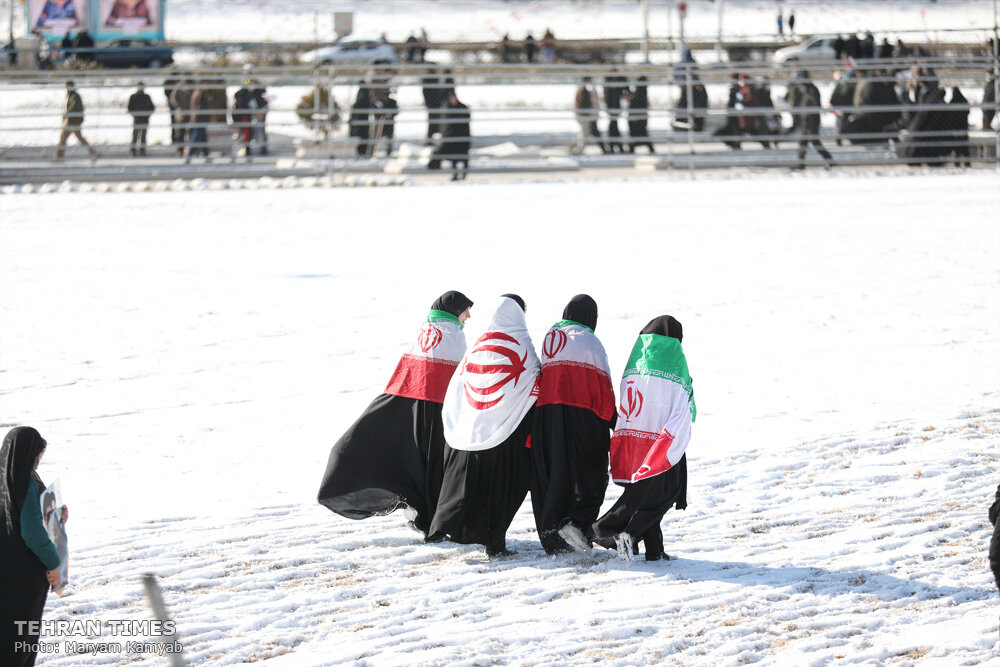
Parliament speaker: Huge turnout empowers Islamic Revolution
Parliament Speaker Ali Larijani said massive participation of people in the rallies marking the glorious anniversary of the Islamic Revolution has led the Islamic Revolution to gain more power.
“The U.S. should know that it must obey the demands of the Iranian nation,” he told reporters on the fringes of rallies in Tehran.
On the approaching parliamentary election, he said, “Surely, people will participate in the election massively and will thwart conspiracies waged by enemies against the country.”
Judiciary chief: Iranians vote for resistance not negotiation
Judiciary Chief Ebrahim Raeisi, who had attended the rallies in the shrine city of Mashhad, told reporters that the Iranians are resolved to resist against enemies’ pressure and rejecting any talks with the foes.
He stated that the U.S. must leave the region. “The region should continue its life without presence of the Americans and arrogant countries.”
Since the assassination of General Soleimani, Iranian political and military officials have said the United States must end its military presence in the region.
In retaliation to the Jan. 3 assassination of General Soleimani, Iran struck a major U.S. military airbase in western Iraq on January 8 with ballistic missiles. New revelations by the Pentagon say that 109 American troops suffered brain injuries in the strike.
However, Iranians are insisting that the retaliatory military strike is not enough and the U.S. must leave the region.
Amoli Larijani: Islamic Revolution is on right track
Chairman of Iran's Expediency Council Sadeq Amoli Larijani, who was in the shrine city of Qom to participate in the rallies, told reporters, “These rallies carry very clear message to the arrogant powers that the Islamic Revolution is on the right path and heading towards its ideals strongly.”
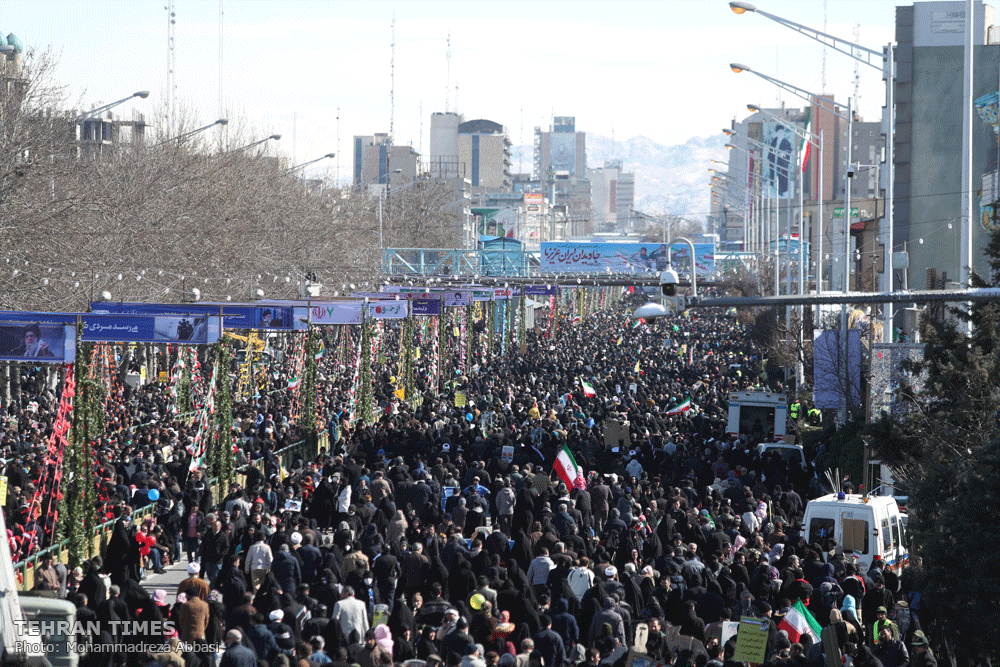
Military chief: No one dares to attack Iran due to its military power
Armed Forces Chief of Staff Major General Mohammad Hossein Baqeri said during the rallies in Tehran that Iran’s defense power has made the enemies to be afraid of even thinking about military aggression against the country.
“Each of us, in any department, should move in line with the Islamic Republic’s path towards strengthening (the establishment),” the commander said.
“(Similar to our activities in military sector) in other sectors, including economy and society, we should achieve enough strength that no one dares to attack the country,” General Baqeri underscored.
Army commander: U.S. must leave the region
The commander of Iran’s Army Ground Force, who was in Tehran’s Azadi Square, said that all Iranians want the U.S. to leave the region.
Brigadier General Kiomars Heidar said, “If the Americans do not pay attention to the call, they should expect tough revenge each second.”
Intelligence minister condemns deal of the century
Attending the rallies in Tehran, Intelligence Minister Mahmoud Alavi censured the controversial plan laid out by U.S. President Donald Trump on the decades-old Israeli-Palestinian conflict, saying the Intelligence Ministry voices its protest against the plan.
“We will announce our opposition to the already failed ‘deal of the century’ by participating in the Bahman 22 rallies alongside the revolutionary people of Iran,” Alavi stated.
He added that during the rallies, “We will renew our allegiance with the late founder of the Islamic Republic Imam Khomeini and commit ourselves to all the freedom-seeking people of the world, promising that we will not stop till we oust the terrorist Americans and occupying Israelis from the region and Palestine.”
Hossein Taeb: Influence of revolution stronger than enemies’ infiltration networks
Hossein Taeb, the head of the IRGC intelligence service, who had also attended the rallies in Tehran, said the enemies have established networks to infiltrate the country since the victory of the Islamic Revolution but each time their plots have ended in failure.
The U.S. is concentrating on infiltration projects in its “hybrid war” against Iran, Taeb added.
Americans and Westerners’ investment on infiltration is increasing day by the day, he said, adding that “they seek to affect the people’s understanding and beliefs via establishing such networks.”
He went on to highlight that Iran’s intelligence services have a good command over such projects.
A large number of military, religious and political figures also attended the rallies across the country.
Ali Janati, secretary of the Guardian Council and head of the Assembly of Experts; Brigadier General Hossein Salami, the chief commander of the Islamic Revolution Guards Corps (IRGC); and Brigadier General Esmaeil Qa’ani, the IRGC Quds Force commander were among the senior officials participating in the rallies and seized the opportunity to express their thanks to the noble nation of Iran who took part in the nationwide rallies.
MJ/PA
